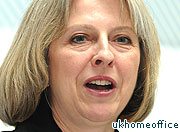Sweeping new Conservative proposals to crack down on ‘extremists’ could damage free speech, critics have warned.
The Extremist Disruption Orders were outlined by the Home Secretary, Theresa May, ahead of her speech to the Tory party conference.
May said she wants action to be taken against people who seek to “spread, incite, promote or justify hatred” against others on a number of grounds, including sexual orientation and transsexualism.
Limit
She said the Orders would be part of the next Conservative manifesto. However, former shadow Home Secretary David Davis described the proposals as “quite incredible powers to limit democratic rights”.
“It will have real trouble both getting through the House of Commons and indeed real difficulty standing up in front of the court”, he added.
Dominic Grieve, the former Attorney General, also expressed concern: “Any restriction on freedom of expression of individuals outside the criminal law is something that has to be approached with very great caution.”
Gagging order
Responding for The Christian Institute, Director Colin Hart said: “These new proposals look set to far exceed even Tony Blair’s notorious Religious Hatred Bill in their scope. This looks like a gagging order, triggered by anything deemed to breach the tenets of the Equality Act.
“There are already extensive anti-extremist powers available to the authorities, but they are not being fully used. The Home Secretary’s proposals fly in the face of her very public espousal of ‘British values’.”
In an editorial, The Independent newspaper said May’s plans “lean too far in the direction of authoritarianism” and would “hack away” at freedom of speech.
Dangerous
The Guardian newspaper described the likely effect as “dangerous”, and said the orders are “not just illiberal but counterproductive”. “They need to be rethought”, it added.
Writing on The Telegraph’s website, commentator Padraig Reidy said the powers are “far too vague”.
He added that it could lead to a “whole spectrum of thought, from anarchism to fundamentalist religion” being banned.
“The law should be about preventing specific harm to the public, not deciding whose ideas are acceptable and whose aren’t”, Reidy said.
Backed down
In her speech, May concluded: “We must face down extremism in all its forms. We must stand up for our values.”
Earlier this year the Government sought to introduce an anti-social behaviour Bill. It could have caught a wide range of activities, including Christian street preaching, carol singing or peaceful protests.
However, following a campaign supported by The Christian Institute and the National Secular Society, the Government backed down on introducing the law.
Last year the Government also gave in to pressure from free speech campaigners when it agreeed to reform Section 5 of the Public Order Act.

